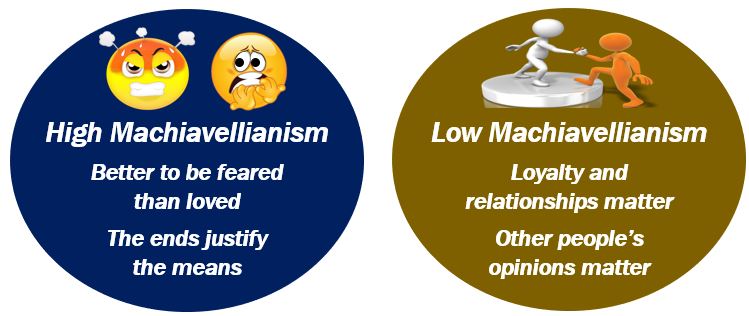Machiavellianism is a political theory or view that supports using any means necessary to maintain political power. Machiavellianism displays a pessimistic view of human nature and promotes unethical and opportunistic ways of manipulating a country’s population.
The theory or philosophy is based on the beliefs of Niccolò di Bernardo dei Machiavelli (1469-1527). Machiavelli was an Italian politician, diplomat, humanist, playwright, poet, and philosopher. Many people refer to him as the ‘father of political science.’
Machiavelli was a senior official in the Florentine Republic for several years. He was in charge of military and diplomatic affairs. From 1498 to 1512, he was the Second Chancery of the Republic of Florence.
The following quote comes from Machiavelli’s book ‘The Prince’:
“Whoever desires to found a state and give it laws, must start with assuming that all men are bad and ever ready to display their vicious nature.”

In modern psychology
Machiavellianism is also a personality trait in modern psychology. A Machiavellian person has a duplicitous interpersonal style. He or she has a lack of empathy and a cynical disregard for morality. The individual focuses on personal gain and self-interest.
“Machiavellianism in psychology refers to a personality trait which sees a person so focused on their own interests they will manipulate, deceive, and exploit others to achieve their goals.”
“Machiavellianism is one of the traits in what is called the ‘Dark Triad’, the other two being narcissism and psychopathy.”

Signs and personality traits
Below are some personality traits that people with Machiavellianism typically have:
- Individuals are focused only on their own interests and ambition.
- They seem confident and charming.
- In order to get ahead, they will manipulate and exploit other people.
- They are typically unaware of the consequences of their actions and behaviors.
- When necessary, they will lie, cheat, and deceive.
- Power and money matters more than relationships.
- They tend to use flattery frequently.
- There is a total lack of values or principles.
- They have a cynical view of morality and goodness.
- Empathy is either deficient or totally lacking.
- To achieve their goals, they are capable of harming others or causing others harm.
- Due to their calculating nature, they can be extremely patient.
- Most people with Machiavellianism find it hard to identify their own emotions.
- Some individuals are difficult to get to know and may seem aloof.
Machiavellianism in the workplace
According to Wikipedia:
“Machiavellianism in the workplace refers to a personality trait where individuals behave in a cold and duplicitous manner in business settings.”
In 2010, a study by a team of researchers – Re‐Examining Machiavelli: A Three‐Dimensional Model of Machiavellianism in the Workplace – was published in the Journal of Applied Social Psychology.
The authors put forward a new model of Machiavellianism based in organizational settings. It consists of three factors:
- Maintaining power.
- Harsh management tactics.
- Manipulative behaviors.
People who are high in Machiavellianism tend to be more willing to lie and are less likely to give honest answers at interviews. They are also skilled liars. In many cases, they see lying in interviews as fair.
A good boss should tap into the resources and talents to support and bring out the best in the employees they manage. People who are high in Machiavellianism do not have the qualities to do this.
In politics, using tricks and lies through manipulative Machiavellian behavior is seen as poor performance.
Examples
-
Machiavellianism in the Tech World: The Case of Data Privacy
In the fast-paced world of technology, companies are in a race to capture as much of the market as possible, often resorting to strategies and tactics that can be viewed as Machiavellian. One of the most contentious areas is data privacy.
Consider the fictional company “TechSphere”. At its inception, TechSphere promoted itself as a champion of user privacy, promising never to sell or misuse user data. However, as competition intensified and the company sought to monetize its user base, its approach began to shift. Behind closed doors, TechSphere started to form partnerships with advertisers, offering them targeted ads based on user behavior and preferences.
To the public, TechSphere maintained its stance on valuing user privacy, but internally, they justified their actions with the belief that providing “relevant ads” enhances user experience. Moreover, the revenues from such partnerships were funneled into creating better products and services, arguably benefiting the users.
When a whistleblower leaked these practices, there was public outrage. Many saw TechSphere’s actions as a betrayal, a classic Machiavellian move where the ends (company growth, better products) justified the means (compromising on data privacy promises).
This incident has sparked a wider debate on corporate ethics, with many advocating for stricter regulations to prevent companies from exploiting user data under the guise of market competition.
In the aftermath, some users defended TechSphere, believing that the company needed to adapt to a changing business landscape. Others felt deceived, arguing that a company’s core values shouldn’t shift based on market pressures.
-
The Rise of Senator Jane Doe
Jane Doe (a fictional character for educational purposes only) began her journey in politics as a city council member in the quaint town of Fairhaven. Over the decades, she navigated the labyrinth of political power, blending public service with astute negotiations and, as some whispered, cunning tactics.
During her time as a state representative, a controversial bill was introduced. Publicly, Doe vociferously opposed it, mirroring the sentiments of most of her constituents. However, behind the scenes, she brokered a deal with the bill’s champions, ensuring significant funds and resources for her district in return for her support.
On voting day, Doe abstained. The bill passed, and soon after, Fairhaven benefited from new infrastructure projects and financial boosts. While her district saw prosperity, her abstention sparked criticism. Supporters of the legislation felt she had turned her back on them, while its opponents felt betrayed by her discreet negotiations.
Doe’s shrewd strategies continued to be a hallmark of her political journey. As she campaigned for a Senate seat, rumors of a scandal involving her primary opponent began to circulate. The source of the leak remained elusive, but its timing was impeccable. With her competitor’s reputation in tatters, Doe secured her position in the Senate with ease.
Throughout her tenure, Senator Doe’s public image was that of a dedicated representative, always at the service of her people. Yet, those with a keen eye noticed the strategic maneuvers she adeptly deployed: a chameleon-like ability to adapt her public positions, seizing opportunities for both personal and regional advantage, and potentially orchestrating discreet campaigns against her adversaries.
While many praised her for the tangible benefits and growth her leadership brought, others couldn’t help but question the methods behind her successes. Senator Jane Doe’s story serves as a reflection on political strategy and the delicate balance between ambition and ethical considerations.
Example sentences
Below are some example sentences containing the word “Machiavellianism” showing you how we can use the term in context
- In the corporate boardroom, where strategic plotting is often key to success, John’s Machiavellianism allowed him to outmaneuver his rivals and secure the promotion he had been eyeing.
- The political candidate was accused of Machiavellianism after a leaked email revealed her tactics of manipulating public opinion through disinformation campaigns.
- During the chess tournament, his Machiavellianism was on full display as he cunningly sacrificed his queen, misleading his opponent into a false sense of security before delivering checkmate.
- The novel’s antagonist displayed a level of Machiavellianism that chilled readers to the bone, with his intricate plots and complete disregard for morality.
- Critics of the government’s foreign policy decried its Machiavellianism, especially the way it supported certain regimes for strategic gain despite their questionable human rights records.
- In a surprising turn of events, the quiet intern’s Machiavellianism came to light when she skillfully navigated office politics to become the CEO’s most trusted advisor.
- The psychologist explained that while Machiavellianism can sometimes be effective in short-term situations, those who employ such tactics often find it difficult to maintain long-term relationships based on trust and respect.
Video – What is Machiavellianism?
This educational video, from our sister channel on YouTube – Marketing Business Network, explains what a ‘Machiavellianism’ is using simple and easy-to-understand language and examples.
